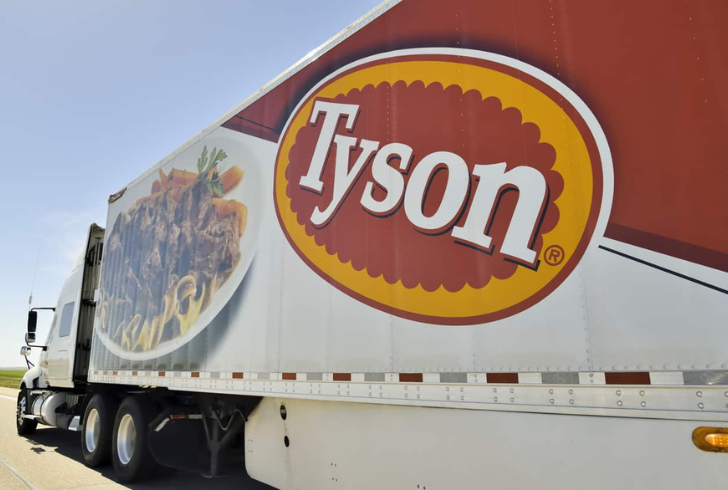
Tyson Foods Boycott 2024 – The Role of Bots in the Movement

Have you ever scrolled through social media and seen a hashtag blow up overnight? It happens all the time, but in March 2024, the hashtag #BoycottTysonFoods became a firestorm. Tyson Foods, a household name synonymous with chicken nuggets and juicy steaks, found itself in the hot seat facing a wave of criticism and calls for a boycott. The Tyson Foods Boycott 2024 quickly became a focal point of debate.
But what exactly happened, and why did this seemingly ordinary business decision spark such outrage?
Plant Closures and Shifting Winds in the Meat Industry

Instagram | jiminstruct54 | Tyson Foods, known for meat and poultry products, shuttered its Perry, Iowa plant in March 2024.
Tyson Foods, a giant in the meat industry, wasn’t immune to the changing tides of consumer preferences and market demands. In mid-March, they announced the closure of a plant in Perry, Iowa, impacting roughly 1,200 employees.
This wasn’t the first closure for Tyson Foods that year, marking the seventh plant to shut its doors. While economic factors likely played a role, whispers started circulating that the company planned to replace these lost positions with a cheaper immigrant workforce.
Bots Fuel the Fire
News travels fast, especially online. The announcement of the plant closure, coupled with rumors about immigration, sent social media into a frenzy. Hashtags like #BoycottTysonFoods and #BoycottTyson began trending rapidly. Here’s where things get interesting – a security firm called Cyabra analyzed the online conversation and discovered a surprising fact: 14% of the accounts participating in the boycott movement were fake! These bots, automated social media accounts, were actively promoting the boycott, spreading negativity towards Tyson Foods, and fueling the online fire.
The Impact of Fake Accounts

Instagram | retailwire | Tyson’s closure announcement sparked reports of plans to hire immigrant workers to fill positions.
While the fake accounts themselves weren’t a massive force in the conversation, their impact was undeniable. They managed to spread their message to a potential audience of over 1.1 million profiles. These bots weren’t all created equal. Some actively pushed the boycott narrative, painting Tyson Foods as a company exploiting the economic situation and stealing jobs from American citizens. Others simply hijacked the trending hashtag for their own gain, posting unrelated content but gaining visibility through the popularity of the movement.
A Growing Threat
The #BoycottTysonFoods case is a stark reminder of the growing threat of fake accounts on social media. These bots can manipulate online conversations, amplify negativity, and damage a brand’s reputation in a short period.
The Tyson Foods Boycott 2024 incident highlights the importance of companies staying vigilant and proactive in the digital age. Implementing tools to identify and mitigate the influence of fake profiles is crucial for protecting brand image and maintaining consumer trust.
Transparency and Building Trust

Instagram | tysonfoods | Bots participating in the #TysonFoodsBoycott underscore a significant digital-age challenge.
In the aftermath of the social media storm, Tyson Foods has a chance to rebuild trust with consumers. Transparency and open communication are key. Addressing concerns about job losses and labor practices head-on can help mend fences.
Additionally, investing in responsible sourcing and ethical labor practices can go a long way in reassuring customers that Tyson Foods prioritizes not just profits, but also the well-being of its workforce and the communities it operates in.
Lessons Learned from Tyson Foods Boycott 2024
The #BoycottTysonFoods movement serves as a cautionary tale for both businesses and consumers. Businesses must be aware of the ever-evolving online landscape and take steps to address potential manipulation by fake accounts. Consumers, on the other hand, should be mindful of the information they encounter online and practice critical thinking before joining any online movements.
By working together, businesses and consumers can navigate the complexities of social media and ensure a more responsible and trustworthy online environment.
More in Investments & Savings
-
`
Council Adopts ‘Listing Act’ to Streamline Listings on the European Stock Exchange
In a landmark decision, the Council has officially adopted the “Listing Act,” a comprehensive legislative package designed to revamp and streamline...
October 18, 2024 -
`
Sophie Turner Shares Her Daily Struggles as a Single Mother
Sophie Turner recently opened up about her immense challenges as a single mother. The 28-year-old British actress, known for her iconic...
October 12, 2024 -
`
How to Align ESG Goals With Your Business Strategy
In today’s corporate landscape, aligning a corporate foundation’s ESG goals with the core strategies of a business has become increasingly crucial....
October 3, 2024 -
`
Vale Ventures to Invest in Mantle, A Startup for Carbon Capturing
In a bold move towards a greener future, Vale Ventures has made headlines by announcing an investment in the Boston-based startup...
September 25, 2024 -
`
Is Selena Gomez a Billionaire?
Recently, rumors of Selena Gomez’s billionaire status, fueled by her ever-expanding business ventures and skyrocketing influence, have gained traction. Gomez, who first...
September 18, 2024 -
`
New ‘Medicare Card’ Scam Is On the Rise – Here’s What You Should Do
Have you recently received a call asking you to verify your Medicare number to get a new card? If so, be...
September 13, 2024 -
`
What Is a Stock Split? Understanding How It Works
Stock splits are a fascinating aspect of the financial world that often pique investors’ curiosity. When a company announces a stock...
September 6, 2024 -
`
Cardi B No Makeup: Proof That She’s a Natural Beauty Queen
Cardi B is known for her bold and extravagant style, often capturing attention with her vibrant fashion choices and daring beauty...
August 31, 2024 -
`
How Long Has Forbes Been in Business? – And What Lies Ahead
For over a century, Forbes has been a pillar of business journalism and financial reporting. Since its inception in 1917, Forbes...
August 21, 2024















You must be logged in to post a comment Login